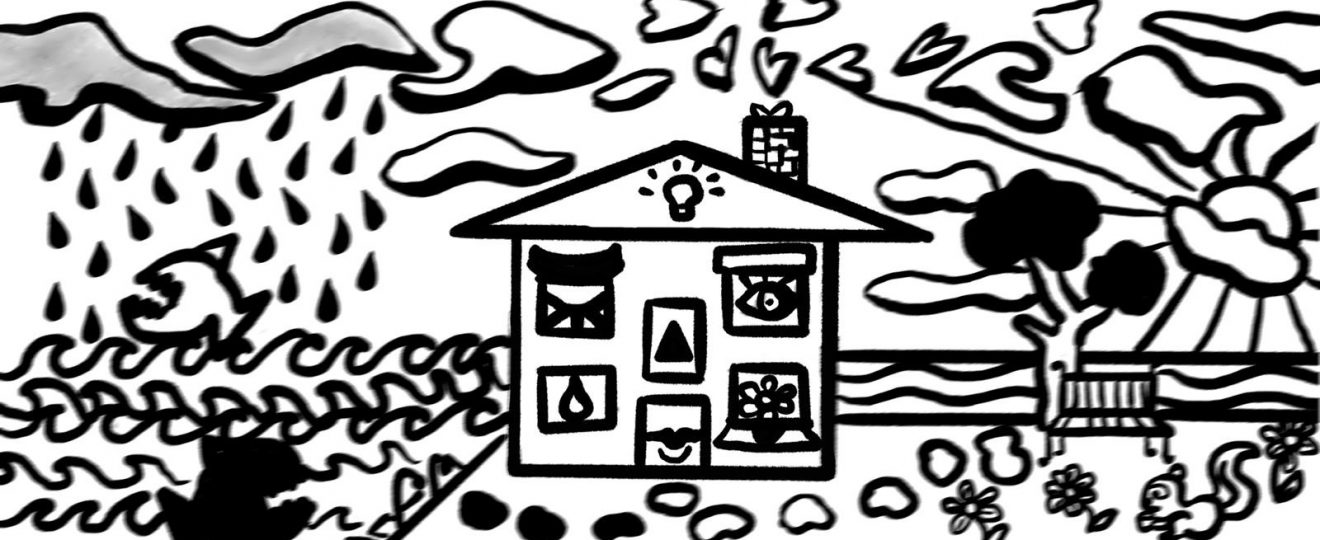Living in four different countries before the age of six years old has warped my perception of what it is to have a home. Considering that psychologically speaking, the most formative period of a child’s development is between the ages of zero and seven, this was an incredibly influential experience for me. My birth took place in Singapore, my first steps in Prague. At age five, I cut myself lopsided bangs in Hertfordshire, England. A year later I experienced my first heavy snow in Maryland, USA. I picked up a camera and took my first photographs in Connecticut, USA at age ten. I (literally) sailed back across the Atlantic Ocean at age eleven on the Queen Mary cruise ship, after being dropped off at the docks in New York in a limousine, which my mum hoped would take the edge off our uprooting (through my tears, I did feel pretty cool). My childhood felt like a series of short yet intense flings with the towns I resided in; a cycle of tentative beginnings, deep love and belonging, disrupted by a sharp heartbreak as I had to say goodbye. Now, at the age of twenty-one, my memories of all these places splinter and morph continuously in my mind; visions of the Czech Republic are so faint, they could be wisps of smoke.
Despite this geographical whirlwind of a childhood, my whole family comes from and on the whole still resides in one place: Glasgow. Throughout my childhood, my family’s Scottish heritage was laced into our family activities. My parents, who are unflinchingly and unquestioningly Glaswegian, did not let go of their culture, despite their globe-hopping, and I am grateful for the parts of their heritage which they shared with me. I got away with identifying as Scottish whilst I lived in America, where people couldn’t really discern between my odd hybrid of an American-English accent and what should sound like a Scottish accent. But for the most part, my life was very separated from Scotland, until around three years ago when I moved to St Andrews to complete my undergraduate degree. I now very much have an English accent, and would not dream of going into a pub in Glasgow and pronouncing myself as Glaswegian, in fear that someone would hear me and let out a hearty laugh. Despite my best efforts, I continue to feel wholly un-Scottish. Both of my siblings also ended up attending university in Scotland, almost reflexively. I have often wondered what drove us all to make this choice, and what we were seeking.
Not having a fixed location to attach to my personhood has sometimes made me feel tether-less. As a product, I have never understood nationalism, or patriotic pride; borders have always just felt like chokeholds to me. Despite this, I understand what a stable location, a home, can give to people. Consistency and comfort. Most people have a connection to a certain place, an emotional tie to a specific location, a town or city where they can feel a sense of returning to themselves, to feel a sense of homecoming. This is not to say that having a location to call ‘home’ is the only prerequisite to security; of course it is not. Other things provided me with constant security: namely, my brilliant and loving parents, and my kind and affectionate siblings. But ultimately, as humans, we want to belong, and we want to feel understood. Consistency and familiarity are core elements of feeling safe, as ultimately, establishing patterns in our minds is what makes us feel in control. The absence of consistency in my surroundings when I was growing up left me desperately seeking a place to belong.
Going to six different schools before the age of eleven was a pretty lonely experience. I soon learnt that the safest way for me to survive was to become hyper-aware of how people felt, thought, and acted around me. If I could anticipate how people were feeling, then I could understand how to make them like me better. Which means that I would find a friend. And fit in. I always described myself as adaptable, and I wore that label like a badge of honour. But really, I think I was a sponge; I would absorb what people around me were saying, and change shape. A chameleon.
Because I felt insecure in my inter-personal relationships, I sought consistency and fell in love with things that I thought were immortal: books. More specifically, as a child, I fell in love with book series. They gave me the utmost sense of consistency, as the fictional characters rarely let me down. When I was ten, I starkly refused to read the last few chapters of Breaking Dawn (for those heathens who do not know, I am referring to the fourth instalment of the Twilight series) for a week, until I exploded into heart-broken tears to my mother, weeping at the prospect of losing the characters that I loved so much. She gently urged me to finish the books, reminding me that I could just simply read them again. Which I did, upon completion. Fifteen times.
When I wasn’t reading stories and finding a place to belong between the breaks in sentences, my imagination was whirring, inviting me to a place that I could construct outside of the physical. I could pause and play an alternate strand of reality that existed only inside my own head, whenever I wanted to. I could dissociate at the snap of a finger, and melt into a story where I was the protagonist; a place that I belonged, a place that I controlled. A place that I didn’t have to worry about having to start over again, a place where the sweet loneliness of yet another first day of school couldn’t reach me, a place where I didn’t have to worry if everyone around me liked me or hated me or saw me, because it was completely in my control. I tried to make my mind my home. Although I am only 51% introverted (according to the ever-trustworthy and accurate 16Personalities online personality test), I ultimately know that this is why I need time to retreat within myself to feel most like myself.
At age eleven, I moved to London, and secondary school commenced. If you had told me at that age that I would be staying at this school until I was eighteen, I would have probably burst into tears on the spot. I was so desperate to move back to America, which my parents promised me would be happening within a couple of years. My time in middle school was spent pining for the town I had moved from in Connecticut; it’s comforting and safe streets, the beach where I learnt to sail, our big, faded, green house, which we still owned and was just waiting for me to slide back into. We would visit Connecticut every few months, and when we would return to London, I would bawl. For days. I have a very visceral memory of lying on my floor in my room wailing after we got back from the airport once. My mum had to deliver a sharp but loving threat: if you keep reacting like this, we are just not going to be able to keep letting you visit.
In middle school, if I was not pining, I was quietly moving around the halls of my new school, where I felt unhappy and unseen. The only respite was my best friend Samah (who I know will be reading this, love you Samah). Samah was equally quiet and uncertain as me, but she is also one of the most hilarious, kind and loving people, who I consider as family still to this day. We recently spoke on the phone about our time in middle school, and she revealed that whenever I would talk incessantly about my dreams of returning to America, it used to make her feel desperately sad, as we had come to rely on each other so much. I know she secretly celebrated each year that I stayed in London and grew further apart from my life in America. This was the first instance in my life where I had found a sense of home in someone else. Samah is now the only person I can FaceTime in tears with no qualms, knowing she loves me unconditionally, and she will greet me with no judgement. That is a sense of home that is immortal and unchanging, beyond the physical.
In middle school, due to my loneliness and unwillingness to embrace my new surroundings, my dependence on my imagination as an escape increased. I began living in my head even more, and this dependence on my imagination just made me feel further divorced from and unhappy with my reality. I struggled to let go of things. I overthought. And overthink. I understand that this has always been a way for me to try and regain control over my thoughts, and my surroundings, which I felt, in those formative years, I did not have any real control over. I just wanted to feel seen, and liked, and to not feel so afraid around everyone all the time. I just wanted to belong. It is also very amusing to think during that time, I was shit-scared of the loud ‘popular’ girls, to the point where Samah and I would have to brace ourselves or take turns to go into the classrooms they populated to retrieve our backpacks at lunchtime. They just seemed so self-assured, so well-liked, so cohesive as a group. They belonged in the school, more than we believed we did. One of those loud girls is now my best friend, Ria, whom I began a tentative but extremely gentle friendship with as middle-school ended and we were placed next to each other in maths class by our teacher. It was an unlikely alliance formed in the confusing chaos of middle-school, where I know that everyone, not just my uncertain self, was seeking a place to belong, a place where they could be seen, as they are, without having to perform.
When I was fourteen, my parents sold the house in Connecticut. Whether consciously or unconsciously, I began to realise I was going to have to engage fully with the community in my school in London. Engaging in community. This was the second instance of me truly finding a sense of home. As we grew and graduated into upper school, my friendship group formed and blossomed. It was hard for me to let go of feeling lonely, and feeling isolated, because these feelings were comfortable for me; in a messed-up way, they made me feel safe. But finding a sense of community in my web of friends at school is one of the best things that ever happened to me.
In sixth-form, a group of around ten of us became thicker than thieves, and we knew the perfect balance between having a good time and deeply caring for each other. If I had to label one specific location as my home, I would say that it was my school. The sixth-form common room was my living room, where my friends and I would spend our free-periods either curled up together on the couches, or dancing in the small part of floor space available (I can’t listen to Work by Rihanna without pissing myself with laughter at the memory of our Head of Sixth Form, Mr Dymock, unknowingly walking into the common room and quickly bolting out in embarrassment, as he found us all dancing in a erm, very non-teacher-friendly way to the song blaring out of someone’s portable speaker). The canteen was my kitchen, the residential parking area that we unfairly invaded with our cars every day was my driveway. On my last day of school, I actually walked around by myself one last time, saying goodbye to all the different rooms in the place I saw as my home, my constant. With hindsight, I know it wasn’t the school itself that was my home, it was the people who filled that space; community provided me with a sense of belonging that no fixed, singular location could.
Moving to St Andrews, Scotland to start university was very hard for me (as you could probably have predicted by now). I initially rejected everything new and different about St Andrews, because I thought nothing could compare to the community that I had at home. But I again had to teach myself to embrace change as a catalyst for growth. I had to find a sense of home outside of the one I was gripping onto (with all ten of my fingers) in my head. I had to let go of tying my identity to a particular place or set of people, and find out who I truly was; what I wanted to attract, what I wanted to identify with, what I truly and consciously wanted to align myself with. Now, in my last year of university, I am fearing the oncoming year, where I will have to say goodbye to my community once again; my community of authentic and intelligent friends, my indescribably beautiful flatmates, the community of creatives I have tentatively nestled myself into. But I am now equipped with the knowledge that home does not reside within a specific place. Home also does not reside within the confines of my skull, or the confines of my anxieties. Home is a feeling, a feeling provided by moments of kindness and inclusion. Belonging does not rely on a specific community or a specific location. These aspects of my life will be ever-changing, as nothing is fixed or everlasting. And that is beautiful, that is beautiful, that is beautiful.
At university, I do not belong to the town itself; although its expansive beaches and cobbled streets fill my heart with comfort and joy. At home, I do not belong to the quiet field behind my house or the small river I intentionally pass on all my runs, or my old school, that I occasionally drive past on my way to the shops. I don’t label myself as from anywhere; I do not bear the identity label of Scottish, or English, or Singaporean, or American. I am an amalgamation of all the people who have touched me, in all of these different places.
Home isn’t a location, it’s a feeling. Home is making dinner and eating it with my flatmates, and telling each other all the miniscule details of our days. Home is reuniting with my friends from home every summer and dancing until we sweat. Home is my parents, my siblings and I meeting for Thanksgiving dinner in Glasgow every year despite only two out of five of us holding US passports, because we want an excuse to be together (and we are otherwise usually splayed across the UK). Home is the smell of my mother’s hairspray (which I go out of my way to buy), which I know we both use right before leaving our bedrooms to go out. Home is taking a big deep breath whilst sitting on a rock on my favourite beach in St Andrews. Home is soft touches in the morning. Home is caressing my own shoulders when there is no one else around to do it. Home isn’t a location, it’s a feeling.
Art by Desiree Finlayson




